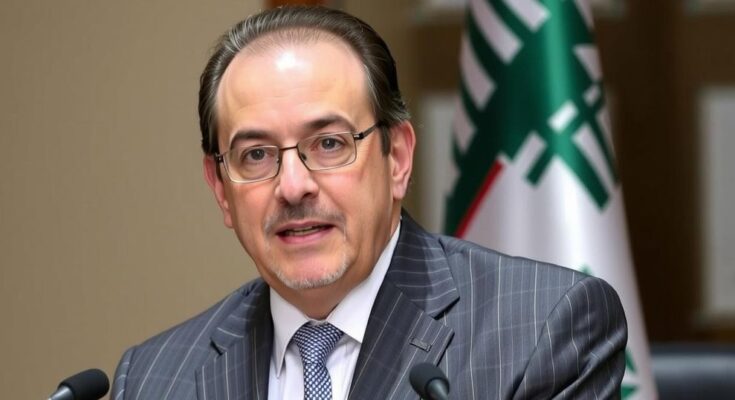Nawaf Salam has been appointed as Lebanon’s new prime minister, receiving broad parliamentary support despite Hezbollah’s efforts to retain power. With a distinguished background, including his role at the ICJ, Salam faces challenges in forming a government amid Lebanon’s ongoing crises and political fragmentations. His appointment follows Joseph Aoun’s presidency, which signifies potential shifts in Lebanese governance and reform efforts.
Nawaf Salam, currently the president of the International Court of Justice (ICJ), has been appointed as Lebanon’s new prime minister. His nomination was supported by a significant majority of the parliament, specifically two-thirds of its 128 members, reflecting the sectarian power-sharing dynamic that governs the country’s political landscape. Salam’s appointment is particularly significant as it represents a setback for Hezbollah, which sought to reinstall the former prime minister, Najib Mikati, but failed to propose any candidates during the parliamentary consultations with President Joseph Aoun.
The 71-year-old Salam is a member of a notable Sunni family in Beirut, with a rich political heritage; his uncle played a crucial role in Lebanon’s independence and held the prime ministerial position several times. Salam’s extensive academic background includes a doctorate in political science from Sciences Po, a doctorate in history from the Sorbonne, and a Master of Law from Harvard. His professional experience includes serving as Lebanon’s permanent representative to the United Nations and working as a lawyer, lecturer, and a member of the ICJ since 2018, where he was recently elected president.
Following his designation, Salam faces the immediate challenge of forming a cabinet that can secure a confidence vote from Lebanon’s fragmented parliament. This comes at a time when President Aoun has pledged to restore the Lebanese state’s authority and to ensure the political and economic reforms that are imperative given the ongoing crises affecting the nation. Imam Aoun’s election as president, supported by various political factions, including Hezbollah and Amal, has initiated what he described as a “new phase in Lebanon’s history”, aiming to confront issues such as fragmented governance and economic distress stemming from prolonged challenges like the conflict with Israel and the devastating 2020 Beirut port explosion.
The political structure in Lebanon is shaped by a sectarian power-sharing system that allocates government positions based on religious affiliations. The prime ministerial post is reserved for a Sunni Muslim, while the presidency is designated for a Maronite Christian. This framework creates ongoing tension between political factions. The recent parliamentary elections culminated in Joseph Aoun becoming president, supported by both traditional and progressive political parties amidst a context dominated by crises, including a long-standing economic downturn and a significant tragedy like the Beirut port explosion. Hezbollah’s influence has waned in the face of recent hostilities with Israel, complicating their political leverage. The appointment of Nawaf Salam as prime minister underscores a pivotal moment in Lebanese politics.
Nawaf Salam’s appointment as Lebanon’s new prime minister marks a transformative point in the nation’s political landscape, particularly for Hezbollah, which is experiencing diminished influence. Salam’s distinguished legal background and political heritage position him uniquely to lead Lebanon through its profound crises. As he navigates the complexities of parliament and aims for reform amidst deep divisions, his leadership will be crucial to addressing the critical economic challenges and restoring governmental legitimacy in Lebanon.
Original Source: www.bbc.com




